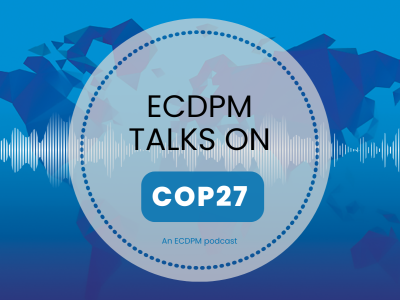Last week, the European Commission’s published
a new policy proposal titled 'the roots of democracy and sustainable development; Europe’s engagement with civil society in external relations’
. aiming to carve out a new and more strategic engagement with civil society organizations (CSOs). This proposal, or ‘Communication’ goes a long way in recognizing and specifically emphasizing the inherent value of a strong civil society
‘as an asset in itself’, over and above its instrumental contributions in bringing about development outcomes. It refreshes the last policy proposal on this matter from 2002, and was informed through a detailed
‘structured dialogue’ with CSOs as well as a public consultation organized earlier this year (no report is available). In addition to recognising the important role civil society plays at regional and global levels, and in multilateral norm setting and advocacy campaigns, the Communication puts
strong emphasis on contributing to a strong civil society at country level. The contribution of local CSOs as partners in dialogue and oversight is ‘at the heart of the EU engagement’. This focus is in line with viewing civil society as an asset in itself. In operational terms, sustained and long-term support to capacity development is envisaged, and funding will be adapted to local needs in order to increase access for local organizations. Furthermore, the policy paper underscores the importance of an enabling environment for civil society, and the responsibility of the EU as a value-driven actor, to stand up for securing it. The role of political and policy dialogue also features prominently in the Communication. We welcome this emphasis and
strategic intent to strengthen civil society in the south.
Top of the pyramid
Yet, an area of weakness is the degree to which the Communication spells out the comparative advantage in different contexts of the various categories of CSOs, including northern versus southern CSOs, NGOs versus less formalized forms of civic organization. It is not clear whether and how the EU will strive to
engage with those organizations it is less familiar with, such as faith-based organizations, unions, and perhaps even social movements. If supporting civil society in the south is important – as an asset in itself – these questions should be high on the EU’s agenda. Of course, such support to civil society in the south is not without its own dilemmas and thorny issues. For instance, the EU recognises the importance of engaging local civil society in policy dialogue, be it with the caveat that CSOs must be independent, representative and competent. The problem is that in many cases they are not. Civil society tends to reflect the power asymmetries in society and in the aggregate is often not fully representative of society’s perspectives. In addition, the EU explicitly chooses to engage with ‘accountable and transparent CSOs which share its fundamental values’. Yet, in terms of participation in policy making, the
full spectrum of perspectives needs to be brought on board in order for the development policy to be broadly owned by society. The Communication does not provide guidance on how to deal with these dilemmas and how to avoid that the EU only cooperates with the ‘top of the pyramid’ of civil society. It in fact partly goes against the recognition of civil society as an asset in itself. To its defense, there are no silver bullet solutions to these dilemmas. The emphasis on the need to ‘take context specificities into account’, and the need for a ‘sound understanding of the CSO landscape and the wider socio-economic context in which they operate’, is indeed pivotal.
Can stiff support fluid?
Another area in which the Communication partially disappoints is the need for more systemic thinking around the role of civil society, which is only presented in reference to CSOs as service providers and not in relation to the other roles that are explored. Unfortunately, it
too often presents the role of civil society in an isolated manner and does not stress the interlinkages between it and other actors sufficiently. Yet, this is one of the most important findings of
the recent OECD/DAC review on domestic accountability and the EU should reflect it here. However, the biggest concern about the communication is that it all sounds quite good on paper, but it is not easy to see how this will translate into practice. A 2008
evaluation of ‘EC aid delivery through civil society organizations’ observed a
strong inconsistency between EC policy objectives and the actual use of the CSO channel; for instance in the tendency to mainly use CSOs as contractors and sub-contractors; in the EC’s limited ability to mobilise their potential in governance-related processes and to assume the risks and responsibilities for it; and in the continuing predominance of European NGO and related under-utilisation of a wide range of local CSOs. Furthermore, the evaluation stressed that the prevailing
institutional culture within the European Commission is not conducive to a strategic approach to engaging with CSOs, due to limited political backing from the top; the priority given in the prevailing administrative and management culture to financial control of aid and short-term (visible) results; and the institutional fragmentation and dispersion of responsibilities for dealing with civil society issues at both Headquarters in Brussels and Delegation in partner countries. This evaluation was conducted four years ago, before the recent institutional changes at the EU took effect. Perhaps this new Communication can indeed provide the impetus to provide the necessary political backing and to remove some of the political and institutional barriers that hamper a true EU strategic engagement with civil society. Yet, we doubt whether the financial and administrative regulations that make the operations of the EC so control-oriented, administrative and
"stiff", can be made sufficiently flexible to deal with such a
"fluid" entity as civil society actors. In this light it would be good to know how the ‘road maps for engagement with civil society’ will be monitored. --
Frauke de Weijer is Policy Officer Policy Officer
Conflict, Security and Resilience at ECDPM.
Niels Keijzer, who co-authored this article, is Deputy Programme Manager
EU External Action at ECDPM.
This blog post features the authors’ personal views and does not represent the view of ECDPM.






